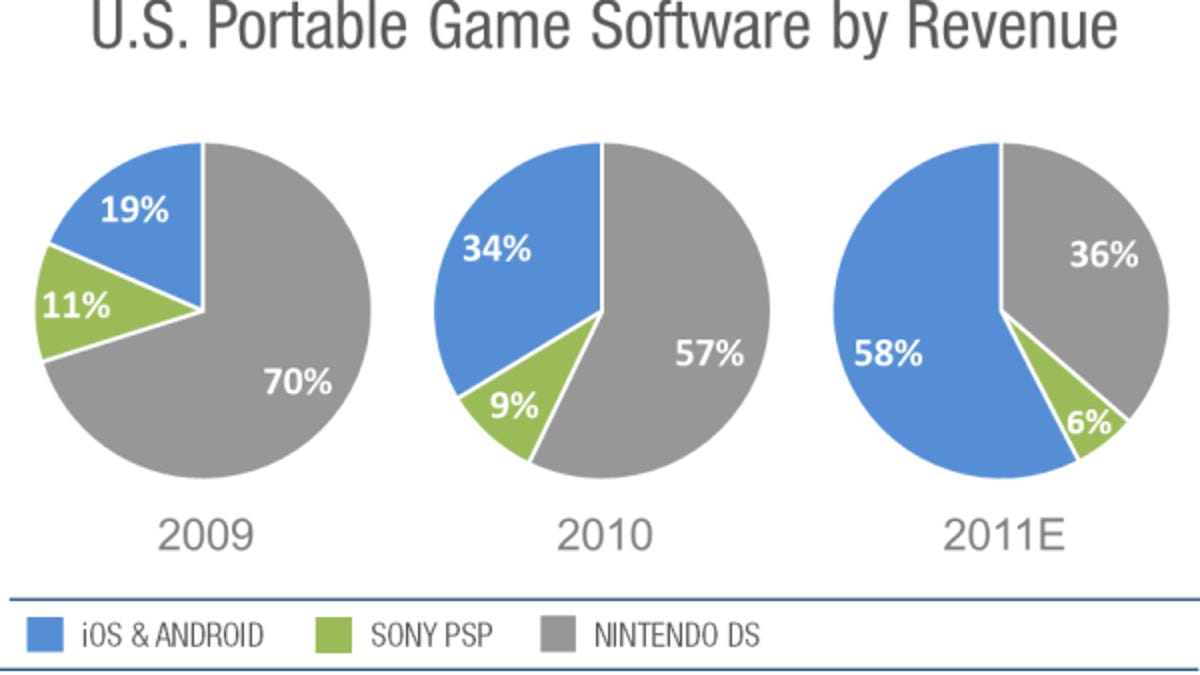Nintendo, Sony: Down to their last lives in portable gaming?
Advantage smartphones and inexpensive downloads. The days of dominance for single-minded consoles and pricey games are winding down fast.

There was a time when Nintendo was synonymous with portable gaming. But now the company is being shoved aside.
According to research firm Flurry Analytics, by the end of 2011, 58 percent of total U.S. portable game software revenue will go to titles being played on Android and iOS. Nintendo's DS family of devices will only be able to grab 36 percent of total U.S. portable game software revenue this year, followed by Sony's PSP with 6 percent market share.
But that's just part of the story. As Flurry points out, in 2009, Nintendo's DS owned 70 percent of the space, while the PSP came in at 11 percent. Android and iOS, on the other hand, had just 19 percent market share. Last year, Nintendo's share of software revenue dropped to 57 percent, while Android and iOS grew to 34 percent. Sony's PSP was only able to nab 9 percent market share.
Such declines have proven extremely troublesome to Nintendo's bottom line. According to Flurry, $2.7 billion was spent on portable games in 2009, and that will likely jump to $3.3 billion by the end of this year. Given those figures, Nintendo generated about $1.9 billion in 2009. This year, however, its revenue should drop to about $1.2 billion. Meanwhile, combined iOS and Android software revenue has jumped from $500 million in 2009 to an estimated $1.9 billion this year.
So, what gives? Unfortunately for Nintendo and Sony, there are several factors playing against them. For one, they're selling devices--the PSP, DS, or 3DS--that can set customers back about $200 to buy the device and get a single game to go with it. What's more, many of the games customers want to buy will cost them about $30 or $40.
Compared to the iPhone or countless Android-based devices on store shelves, that can be quite expensive. After all, consumers can buy a 16GB iPhone 4S right now for $199, and start downloading high-quality games like Angry Birds for just a few bucks. Even better, some iOS and Android developers offer free games for owners to try out.
There's also the issue of hardware functionality. As CNET's Jeff Bakalar pointed out in a recent column discussing why portable gaming "needs to go away," consumers have a one-stop shop in today's smartphones, allowing them to place calls, check e-mail, surf the Web, and play games. And although devices like the 3DS or Sony's upcoming PlayStation Vita try to add more features than just gaming, their main focus is video games.
"Portable console gaming no longer has a practical place in the current landscape of casual flick, drag, and swipe games," Bakalar wrote in his discussing on portable systems last month. "There is no room for the 3DSes and Vitas of the world when all-in-one functionality is now more important than high-tech, gaming-focused mobile systems."
Nintendo is learning that lesson the hard way. Earlier this year, the company launched its 3DS with the hopes of extending its successful streak in the portable-gaming space. But after selling just 710,000 3DS units worldwide in the second quarter, the company was forced to slash its price from $249.99 to $169.99. Even after that cut, sales have been sluggish, trailing far behind the DS and Game Boy at the same point in their respective lifecycles.
So, what can Nintendo do? If it was up to Flurry, the unthinkable: "consider difficult choices such as divesting its hardware business and distributing its content, for the first time, across non-proprietary platforms."
Nintendo has said time and again that such a move is not even on the table. But in the end, financial realities dictate decisions at public companies. And if things continue the way they are for Nintendo, it might have no other choice but to bring its games to iOS or Android.

